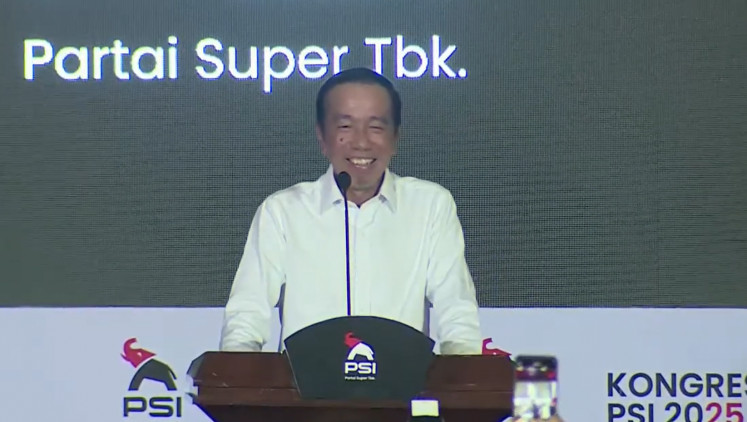Popular Reads
Top Results
Can't find what you're looking for?
View all search resultsPopular Reads
Top Results
Can't find what you're looking for?
View all search resultsRosihan Anwar, a role model for Indonesian journalists
The sheer number of prominent figures — no less than President Susilo Bambang Yudhoyono and Vice President Boediono — paying their respects Thursday to senior journalist Rosihan Anwar, who passed away at the age of 88, was testimony to the contribution he made to Indonesian journalism and public affairs
Change text size
Gift Premium Articles
to Anyone
T
he sheer number of prominent figures — no less than President Susilo Bambang Yudhoyono and Vice President Boediono — paying their respects Thursday to senior journalist Rosihan Anwar, who passed away at the age of 88, was testimony to the contribution he made to Indonesian journalism and public affairs.
Rosihan, who began his journalism career in 1942, was widely respected for his integrity. In the course of his journalism career, he persistently stayed true to his principle that truth had to be fought for and upheld no matter what, despite the huge risks faced. He never compromised his conscience and his deeds were shown through real actions.
Indonesia’s first president Sukarno forcibly shut down a newspaper Rosihan founded, the Pedoman, in 1961 because the newspaper often carried stories that were critical of Soekarno’s policies. He resurrected the respected newspaper after Soekarno was forced from power by Soeharto in 1966-1968, but again it was shut down by Soeharto for the same reasons in 1974.
Earlier, Soeharto offered Rosihan the post of ambassador to Vietnam in the early years of the New
Order, but he turned it down.
“Soeharto was very upset. Since then, Soeharto never appointed journalists as ambassadors to friendly
countries.
Soeharto started to relax the unwritten rule only in 1991,” recalled veteran journalist Sabam Siagian. Sabam, who was then chief editor of The Jakarta Post, was appointed by Soeharto as Indonesian ambassador to Australia in 1991.
Apart from his steadfastness to upholding the truth and the ethics of journalism, Rosihan was also known as a “walking dictionary of Indonesian history”. He earned the nickname as he was often present during, and then diligently chronicled, important events in Indonesian history.
Among the historical events he witnessed and eventually reported on was the famous revolutionary battle in Surabaya in November 1945, which is now commemorated nationwide as National Heroes Day.
Later, he was also present during a series of crucial negotiations between Indonesia and the Dutch colonial government that eventually led to the recognition of Indonesian sovereignty by the former colonial master.
Even after he was no longer employed by any press organization on the grounds that he already passed retirement age, he still eagerly reported milestone events in the country’s history, including the Malino Conference in South Sulawesi in the 1990s that ended prolonged bloody sectarian conflict between Muslims and Christians in Maluku.
Apart from his relentless curiosity, another quality young journalists can look to Rosihan as an example
of is his passion for the writing world. He continued to write even until the final weeks of his life. He authored more than 40 books and countless newspaper and magazine articles.
Rosihan had his own reasons for his passion for writing.
“I will continue to write until I drop dead. It is to prevent senility.
“And besides that, I have to write because there is no social welfare in this damned country. I have no
pension so I have to write,” he joked to the Post in an interview two years ago.
Although his health deteriorated due to old age, he still frequently attended journalism and public events, a testament to his penchant for public affairs. The journalist of four generations (the Indonesian revolution, Old Order, New Order and Reform era) often offered critical accounts on current affairs at various public events.
President Susilo Bambang Yudhoyono admitted that Rosihan had a critical mind, the prime asset of being a great journalist.
“I still remember our last talk at the State Palace. He put forth his critical views with sense of responsibility and good intentions,” the President said Thursday.
The critical views were not only uttered during public discussions, but were also expressed in poems. One of poems he wrote in the final years of his life was about anticorruption, which was inspired by a famous poem by Taufiq Ismail titled Malu Aku Jadi Orang Indonesia (I am ashamed of being Indonesian).
Given his dedication and contribution to journalism and public affairs, Rosihan deserves the title “The father of Indonesian journalism”. His legacy will always be remembered and should serve as guidance for journalists doing their job — strengthening the contribution of journalism to the betterment of this country.
The author is a staff writer at The Jakarta Post.










